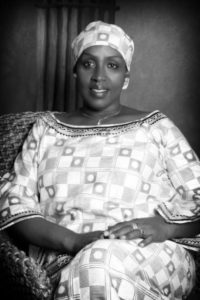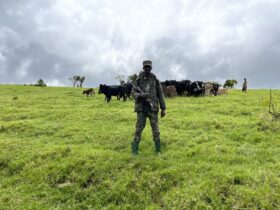
At some point in Goma there were no more Rwandan men; they had all joined the struggle. If you were an able-bodied man and you were still hanging around in Goma, aunties scorned you, girls didn’t date you and grandmothers called you Chantal, Yvette, or some women’s names to mean that you are a coward. Even some young girls went, so calling you Chantal was actually an insult to real Chantals. The same thing in Burundi.
By the time I started high school I was eleven years old because teachers had jumped me primary four. I was barely taller than the P.6 backpack my mother had bought me the year before. My mother was no more, but that’s a story for another day. I stayed with my grandmother and my aunties. I had had a happy childhood, but now things were tough, bread earners had gone to war, to liberate our country. I didn’t finish my first year of secondary school though, because we finally returned home to Rwanda; it was time.
ITIG it was called; Institute Technique Industriel de Goma. It was the best school for boys in Goma, a catholic school of the congregation of Salesians; a bit like IFAK here in Kigali. It was far though, one had to cross the Airport and walk a long distance to get to Katindo where we lived. At the time there was an anti-Tutsi atmosphere; it was a seasonal thing. We lived in peace, then, some incident happened and they hated us for no apparent reason. Sometimes the said incident had nothing to do with us or it was just insignificant. Take for instance Filmmaker Eric Kabera’s brother, Elias Kabera, who was supposed to be a defender, went and scored an injury time goal for his team; and Zairians would go: ‘Eh, ata njo, aba batusi banakuwaka aye? Elias anatoka mu defense, ana enda yaza Goal, na ni Mutusi?’ (How can a guy come from the defense where he is supposed to be, go ahead and score a goal; yet he is Tutsi), For weeks after the game, Tutsis would be intimidated, beaten, etc. I have actually never understood why people hate Tutsi in this region, me I find them nice; ok, some are irritating, but most are fun people.
Between 1993 and 1994 though, there was deep-rooted hatred against Tutsi. I had a math teacher who terrorized me in class; Kalioko Mbwila he was called: Bastard! If I was white, I would still be consulting a psychiatrist over that experience. The fool pinched my nipples very painfully every day until I had blisters. When he entered in class I was traumatized, Phew, I am so glad to be home in Rwanda. I suspect Kalioko, probably a given name, was a member of MAGRIVI. The Hutu community in Goma had formed what they called the Mouvement des Agriculteur de Virunga ‘MAGRIVI’, a group whose mission had nothing to do with farming, but just to fuel hatred against the Tutsi. The group became even more powerful after Mobutu had sent his troops to help Habyarimana and, like many others, they were beaten by the RPF. When they returned to Goma, the old anti-tutsi songs picked up again:
Some of the songs with totally unrelated themes, but who’s chorus would, of course be something against Tutsi. Take ‘Le 24 Novembre’ for instance. A song about Mobutu taking power, changing the regime, yare yare, who’s landing, was ‘Batusi banayala mu etage ya katindo!’ Most people didn’t care much about the propaganda in the song, probably didn’t know the lyrics, but all repeated the Batusi part by heart; we the kids also sung it. Increadible!
The Etage ya Katindo was an uncompleted building, abandoned by Belgians upon Zairian independence in 1960, where some Tutsi sought refuge. While most went deeper into Bibwe, Masisi and Rutchuru, those who stayed in Goma, hundreds of families, our grandparents, lived there and our parents were born there.
Anyway, school ended at 1PM, but I couldn’t cross the airport alone. Serge my cousin was in second year and already tall. Also, his father, who was a boxing teacher had taught him to fight; you all know Serge of Papyrus, I had to cross with him and my other cousins… Because I was first in class and a Tutsi, Zairians would all harass me as I crossed the Airport, until a Rwandan (read Tutsi) would pass by. Ironically, we were not allowed to return to Rwanda, but Zairians called us ‘Rwandais’. Officially there were three tribes of Rwandans who lived there, two of them could come to Rwanda and go back as they pleased, we couldn’t, but we were the ‘Rwandais’! Others were left alone.
But we ‘Rwandais’ had a strong solidarity. I would be chased for not paying school fees, and the first Rwandais adult I met, at 10 AM, would ask why I was not in school; ‘Balinifukuza juu ya minerval’, and without a word, he’d take my hand and turn me around, we’d go to school, he’d settle the fees, and I’d go back to class. In the evening when I returned home, I needed not report that, it was normal, and one of my uncles had probably done the same for another kid. Some ‘Rwandais’ teachers would give up part of their salaries to cover a few kids. It was a different dynamic back then; a Rwandais dynamic…
Anyway, if Serge was unavailable to cross the airport with me, I had to do a detour to a famous, popular neighborhood called Birere. Most Rwandais lived in Birere; especially all the rich, stylish, perfumed guys you see in Kigali today, who will only admit to you that they lived in “Berlin” as they call it, under heavy torture; All say they lived in neighboring “Virunga”, “Office”, etc., just to avoid Birere; it’s a bit like Kibera in Nairobi…
For some weeks I reckon Serge had to stay behind to study, so I took the Birere road detour, it was twice as long the distance and the sun was at the zenith. Mama Farida, Mariam Sirajji, had a shop in Birere. She saw me passing by once or twice and one day she sent one of her handlers to call me in her shop. Are you ‘Rwandais’? I said yes, and directly she switched to Kinyarwanda: ‘Uri umunyarwanda?’ Yego. Uravahe, urajyahe se? Mvuye ITIG, ngiye Katindo? Eh!? She was happy and heartbroken at the same time. First because I was 11 years old in high school, and second because of the distance I walked every day. From now on, she said to me, ‘When you come from school, you pass by here, you eat, you rest, then you go home in the evening after the sun has gone down’, and on that she turned to Farida her first born and said twara mujyenzi wawe mu Nzu: (Take your brother in the house) We didn’t say a word, I went up, took a shower, changed into the clothes of Faycal, Asad or Bebe, one of my young brothers there, ate, then went to play video game with them as though we had always lived together. Again, when I went home in the evening I barely mentioned it, of course families knew each other, so they didn’t make a big deal out of it. I had not ‘eaten mubanyamahanga’; they were ‘Rwandais’, so there was no incident. We’ve been family ever since; she is my Godmother.
It is long after we had returned home to Rwanda that I realized I was not the only Rwandais to be blessed by that family. Hajj Sirajji Ndangiza, the husband of my Godmother has been decorated posthumously as a Rwandan hero, for his contribution to the liberation struggle. He was my friend, told me great stories, but the best people to tell his story are all the ‘Inkotanyi’ who were in Ibirunga’. He lived in Bunagana, just on the feet of the volcanoes; his home was like an RPF Base…
To all the heroes in this unstructured story, to all the ‘Rwandais’; happy Iyambere Ukwakira: Oye Nkotanyi!
















I would have liked if “les Rwandais” had kept the same spirit of solidality even today!
Hahahaaa… my young brother, unyibukije byinshi mon petit, we were neighbours! I remember your beautiful mon and grandma, your uncle Julien and others, aunties Dudu, Coco,… I was born at Katindo hospital in January 1974, first lived in Birere ku kibabi avenue Kasiksi when my father was working at Poste (he was Capt. with Red Cross) before moving to katindo gauche, studied at ITIG too in Electricity ,was servant de messe à la paroisse de katindo. I left Goma mid 1991 to join the struggle, glory be to God I’m alive,my thoughts goes to my comrades freedom fighters, I believe their souls are resting in eternal peace. My generation went through same harrassments, that’s why most of us trained in karate to defend ourselves! We used to seriously beat them too, especially when asked them what we called “match” at the “Mont Goma”,hahaaa… Good to remind us all that, Cheers!
But of course I know you grand Benoit, always have. It’s been a while, I hope all is well. God bless.
Great, I’m fine doing well! Inbox me,Cheers!
Gatete, this article is so powerful in many ways: you relate the ordeals that many have gone through, but mostly you have shown appreciation to a family full of love! Being grateful is next to God, I am happy that Mama Farida is alive and can enjoy the respect and love she spread. I don’t know her but I would like one day to give her a hug, and tell her that she is “umubyeyi mwiza”! Great her for me and to you, take one from me, you are a man of values!!!
Ha ha ha “Yo Rwandais” unanikumbusha mambo mingi kabisa kama :
Ona bulefu kama njia ya kwenda Rwanda…..
Harabaye ntihakabe!
Anyway, may God bless Mama Farida for ever and may Hadji Sirajji RIP, balikuwa vrais Inkotanyi kabisa na Mtoto wake Afande Mubaraka ataendelesha struggle tusijali.
Thanks for the great story. Echoed my own experience but on the other side of Zaire (Kinshasa), yo rwandais! sounded like an insult back then, but today I realize that we were a “special people”.
hello cousin, you have just mentioned an untold story of batusi in Zaire !!!! mbega mbega, before joining the strugglebin 1991, I fought my maths teacher, a former Habyarimana spy, member of magrivi who stated that PK is dead and that our ….is sealed…
Uwanyereka Gatete at 11 🙂